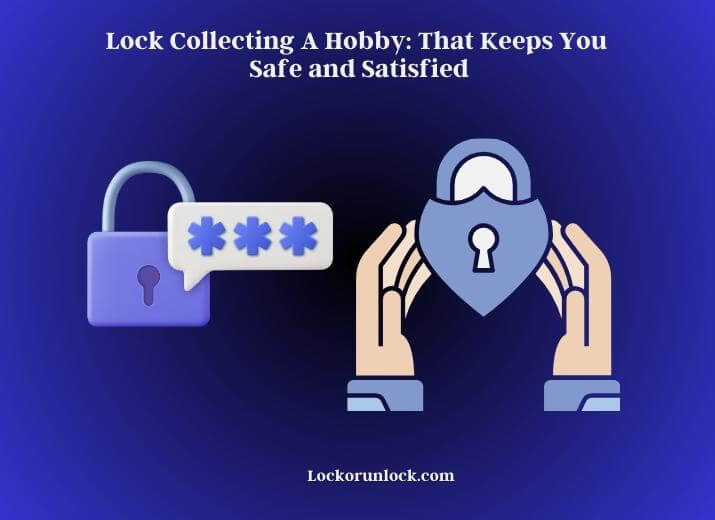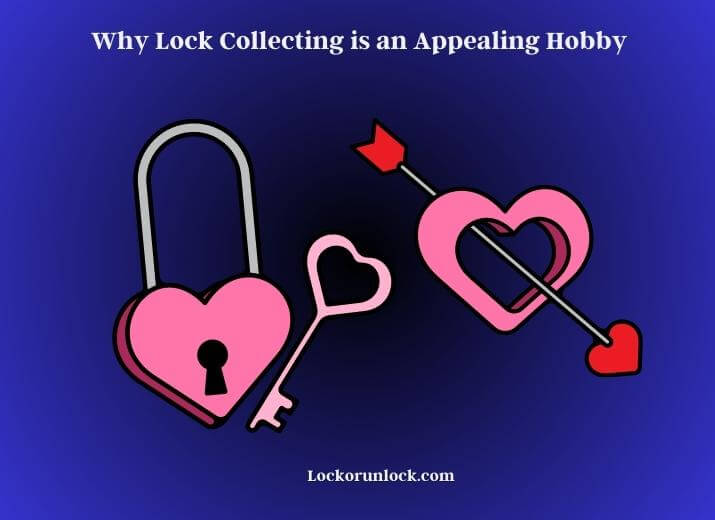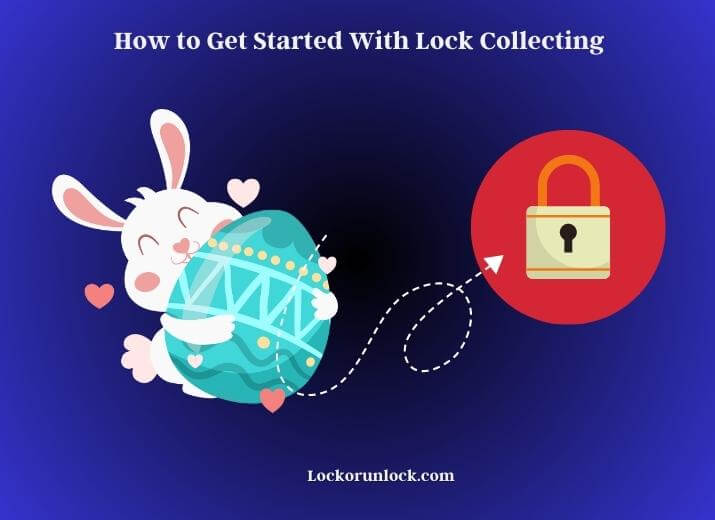Hobbies are a fantastic way to unwind, relax, and escape from the stresses of everyday life. From reading to cooking, gardening to playing music, everyone has something that they enjoy doing in their free time. Lock collecting is a lesser-known but equally fascinating hobby that has been gaining popularity among enthusiasts.

Locks have been around for thousands of years and have evolved over time to become intricate and complex mechanisms that are designed to keep our valuables safe. The art of lockpicking and the challenge of opening these mechanisms has been a subject of interest for many people. Lock collectors take this fascination one step further by hunting for unique and rare locks, often with historical significance, and adding them to their collections.
The History of Lock Collecting
The history of lock collecting dates back to the early days of locks and keys. Locks have been used for thousands of years to secure valuables, from ancient Egyptian tombs to medieval castles. The art of lockpicking, the practice of opening locks without the proper key or combination, has been around just as long. While lockpicking has sometimes been associated with criminal activity, it has also been used for legitimate purposes such as law enforcement and security testing.
Lock collecting as a hobby emerged in the 20th century, as people began to appreciate the beauty and intricacy of locks as works of art and engineering. Many collectors focused on antique and vintage locks, seeking out rare and unique pieces that reflected the history and evolution of lock design. In some cases, locks were collected for their historical significance, such as locks used during wartime or infamous heists.
Lock collecting also became popular among lockpicking enthusiasts, who enjoyed the challenge of opening new and different types of locks. Some collectors even specialized in certain types of locks, such as padlocks, lever locks, or combination locks.
Today, lock collecting remains a niche hobby, but it has a devoted following of enthusiasts around the world. Many collectors use online marketplaces and auction sites to buy and sell locks, while others attend conferences and events where they can connect with other collectors and learn more about the history of locks and lock collecting. The history of lock collecting is a fascinating one, and it reflects the enduring human fascination with security, technology, and design.
Why Lock Collecting is an Appealing Hobby
Lock collecting is a fascinating and appealing hobby for many reasons. Here are some of the main factors that make it so popular among enthusiasts:

The Thrill of the Hunt
One of the most exciting aspects of lock collecting is the search for new and unique locks to add to your collection. Whether you’re scouring antique shops, combing online marketplaces, or attending auctions and estate sales, there’s always a sense of anticipation and excitement as you look for that next great find.
The Challenge of Opening Locks
For many lock collectors, the challenge of opening and decoding different types of locks is a major draw. Whether you’re using traditional lockpicking techniques or exploring new methods, there’s a sense of satisfaction and accomplishment when you’re able to open a lock that others may have deemed impossible.
The Satisfaction of Ownership
Owning and displaying a collection of locks can be a source of pride and satisfaction for many enthusiasts. Whether you’re showcasing your collection in your home or office, or sharing it with other lock collectors online, there’s a sense of satisfaction that comes from knowing that you’ve curated a unique and valuable collection.
The Social Aspect
Lock collecting can also be a social hobby, as many enthusiasts enjoy connecting with other collectors online or at events and conferences. This sense of community and shared interest can be a great way to meet new people and build lasting friendships.
The History and Craftsmanship
Finally, many lock collectors are drawn to the history and craftsmanship of locks themselves. Locks have been around for thousands of years, and each one tells a story about the people who created it and the era in which it was made. Whether you’re interested in antique padlocks, vintage lever locks, or modern high-security locks, there’s always something to learn and appreciate about the art and science of lock design.
Types of Locks and Key Features to Look for
Lock collecting is a diverse hobby, with enthusiasts collecting a wide variety of different types of locks. Here are some of the most popular types of locks and key features to look for when building a lock collection:
Antique and Vintage Locks
Antique and vintage locks are some of the most popular types of locks to collect, with many collectors specializing in locks from specific eras or regions. When collecting antique and vintage locks, it’s important to look for locks that are in good condition, with all of their original parts intact.
Padlocks
Padlocks are another popular type of lock to collect, with many collectors seeking out rare and unusual padlocks. Some collectors focus on padlocks from specific manufacturers or time periods, while others collect padlocks with interesting or unique features.
Lever Locks
Lever locks are a type of lock that use a series of levers to prevent the bolt from being retracted without the proper key. When collecting lever locks, it’s important to look for locks with a high number of levers, as these are often the most complex and challenging to pick.
Combination Locks
Combination locks are a type of lock that uses a sequence of numbers or symbols to unlock the mechanism. When collecting combination locks, it’s important to look for locks with interesting or unusual dial designs, as well as locks with high levels of security.
High-Security Locks
High-security locks are locks that are designed to be difficult or impossible to pick or bypass. These locks often feature complex keyways, advanced anti-picking mechanisms, and other features that make them challenging for even the most skilled lockpickers to open. When collecting high-security locks, it’s important to look for locks with a strong reputation for security, as well as locks with interesting or unusual design features.
How to Get Started With Lock Collecting
If you’re interested in starting a lock-collecting hobby, here are some steps to help you get started:

Research and Learn
Before diving into lock collecting, it’s important to do some research and learn about the different types of locks, their history, and their features. There are many online resources available for lock enthusiasts, including forums, blogs, and online marketplaces where you can find information and connect with other collectors.
Start Small
When starting a lock collection, it’s important to start small and build your collection gradually. Consider starting with a specific type of lock, such as antique padlocks, and gradually expanding your collection as you learn more and discover new locks to add.
Find Locks to Collect
There are many ways to find locks to add to your collection, including antique shops, flea markets, online marketplaces, and even garage sales. Look for locks that are in good condition and have interesting features or designs.
Learn How to Open Locks
While not strictly necessary for lock collecting, learning how to open locks can be a valuable skill and can add to the enjoyment of the hobby. There are many resources available for learning lockpicking techniques, including online tutorials and in-person classes.
Display Your Collection
Once you’ve started building your lock collection, consider displaying it in a way that showcases your locks and makes them easy to view and appreciate. This could be as simple as a shelf or display case in your home, or a more elaborate exhibit at a lockpicking conference or event.
By starting small, doing your research, and gradually building your collection, you can create a unique and valuable collection of locks that reflects your interests and passions.
The Ethics of Lock Collecting
While lock collecting can be a fascinating and enjoyable hobby, it’s important to consider the ethical implications of collecting locks. Here are some ethical considerations to keep in mind when collecting locks:
Legality
It’s important to ensure that the locks you are collecting are obtained legally. This means not stealing locks, and avoiding any locks that may have been stolen or obtained through illegal means.
Cultural Sensitivity
Some locks may be considered culturally significant or sacred, and it’s important to approach these locks with sensitivity and respect. This may mean avoiding locks that are associated with religious or cultural practices that you are not a part of, or seeking out guidance from experts or community members before collecting locks from certain cultures or regions.
Preservation
Lock collecting can play an important role in preserving the history and design of locks, but it’s important to also consider the preservation of locks as cultural artifacts. This means avoiding damaging or altering locks, and ensuring that they are stored in a way that protects them from damage or decay.
Education
Lock collecting can be a valuable educational tool, but it’s important to ensure that the information you are sharing about locks is accurate and respectful. This means avoiding perpetuating myths or stereotypes about locks or lockpicking and respecting the privacy and security of individuals and organizations that use locks for protection.
Conclusion
Lock collecting can be a fascinating and rewarding hobby for anyone interested in the history, design, and culture of locks. By approaching lock collecting with respect, sensitivity, and a commitment to ethical principles, you can build a valuable and unique collection of locks that reflects your interests and passions.
Whether you’re interested in antique padlocks, high-security locks, or unique and unusual locks from around the world, there are many opportunities to learn and grow as a lock collector. By starting small, doing your research, and gradually building your collection, you can develop a deep appreciation for the art and science of locks, and contribute to the preservation and appreciation of locks as cultural artifacts and symbols of security.
So if you’re looking for a new hobby that combines history, design, and culture, consider lock collecting as a fun and rewarding pursuit. With the right approach and a commitment to ethical principles, you can build a collection that reflects your interests and passions, and join a community of lock enthusiasts who share your love for this unique and fascinating field.
